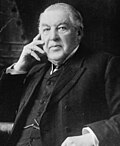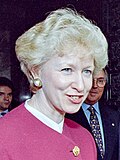Tory leaders since Confederation
This is a list of leaders of the Conservative Party of Canada (historical) (1867–1942), Progressive Conservative Party of Canada (1942–2003), and Conservative Party of Canada (2003–present) ("the Tory parties"), and of prime ministers of Canada after Confederation who were members of those parties.
Conservative (1867–1942)
| Name | From | To | Riding as leader | Notes | |
|---|---|---|---|---|---|
 | Sir John A. Macdonald | July 1, 1867 | June 6, 1891 | Kingston, ON (1867–18, 1887–91); Victoria, BC (1878–82); Carleton, ON (1882–88) | 1st Prime Minister |
 | Sir John Abbott | June 16, 1891 | November 24, 1892 | Senator for Inkerman, QC | 3rd Prime Minister |
 | Sir John Sparrow David Thompson | December 5, 1892 | December 12, 1894 | Antigonish, NS | 4th Prime Minister |
 | Sir Mackenzie Bowell | December 21, 1894 | April 27, 1896 | Senator for Hastings, ON | 5th Prime Minister |
 | Sir Charles Tupper | May 1, 1896 | February 6, 1901 | Cape Breton, NS | 6th Prime Minister |
 | Sir Robert Laird Borden | February 6, 1901 | July 10, 1920 | Halifax, NS (1900–04, 1908–17); Carleton, ON (1905–08); Kings, NS (1917–21) | 8th Prime Minister |
 | Arthur Meighen | July 10, 1920 | September 24, 1926 | Portage la Prairie, MB (1908–21, 1925–26); Grenville, ON (1922–25) | 9th Prime Minister |
 | Hugh Guthrie (interim leader) | October 11, 1926 | October 12, 1927 | Wellington South | |
 | R. B. Bennett | October 12, 1927 | July 7, 1938 | Calgary West, AB | 11th Prime Minister |
 | Robert Manion | July 7, 1938 | May 14, 1940 | London, ON | Resigned after lost seat in 1940 election |
 | Richard Hanson (interim leader) | May 14, 1940 | November 12, 1941 | York—Sunbury, NB | |
 | Arthur Meighen | November 12, 1941 | December 9, 1942 | Senator for St. Marys, Ontario | Resigned after defeat in attempt to enter House of Commons via York South by-election |
Progressive Conservative Party of Canada (1942–2003)
| Picture | Name | Term start | Term end | Riding as leader | Notes |
|---|---|---|---|---|---|
 | John Bracken | December 11, 1942 | July 20, 1948 | Neepawa | Former Premier of Manitoba |
 | George Drew | October 2, 1948 | November 29, 1956 | Carleton | Former Premier of Ontario |
| William Earl Rowe | November 29, 1956 (Interim) | December 14, 1956 | Dufferin—Simcoe | Interim leader until 1956 leadership convention | |
 | John Diefenbaker | December 14, 1956 | September 9, 1967 | Prince Albert | 13th Prime Minister of Canada |
 | Robert Stanfield | September 9, 1967 | February 22, 1976 | Halifax | Former Premier of Nova Scotia |
 | Joe Clark | February 22, 1976 | February 19, 1983 | Rocky Mountain, Yellowhead | 16th Prime Minister of Canada |
| Erik Nielsen | February 19, 1983 (Interim) | June 11, 1983 | Yukon | Interim leader until 1983 leadership convention | |
 | Brian Mulroney | June 11, 1983 | June 13, 1993 | Central Nova, Manicouagan, Charlevoix | 18th Prime Minister of Canada |
 | Kim Campbell | June 13, 1993 | December 14, 1993 | Vancouver Centre | 19th Prime Minister of Canada |
 | Jean Charest | December 14, 1993 | April 2, 1998 | Sherbrooke | Former Premier of Quebec |
 | Elsie Wayne | April 2, 1998 (Interim) | November 14, 1998 | Saint John | Interim until 1998 leadership election |
 | Joe Clark | November 14, 1998 | May 31, 2003 | Kings—Hants, Calgary Centre | His second tenure as leader |
 | Peter MacKay | May 31, 2003 | December 7, 2003 | Central Nova | Final leader of the Progressive Conservative Party; merged the PC Party with Stephen Harper's Canadian Alliance in 2003, cofounding the new Conservative Party of Canada. |
Conservative Party of Canada (2003–present)
| Leader | Term start | Term end | Constituency | Notes | ||
|---|---|---|---|---|---|---|
| — | John Lynch-Staunton | 7 December 2003 | 20 March 2004 | Senator for Grandville, Quebec | Interim leader, served concurrently as Senate Opposition Leader. | |
| 1st |  | Stephen Harper | 20 March 2004 | 19 October 2015 Acting: 19 October 2015 – 4 November 2015 | Calgary Southwest, Alberta | First official leader of the modern Conservative Party of Canada; Served as Leader of the Official Opposition from 2004–2006, and Prime Minister from 2006–2015. |
| — |  | Rona Ambrose | 5 November 2015 | 27 May 2017 | Sturgeon River—Parkland, Alberta | Interim leader, served concurrently as Leader of the Official Opposition. |
| 2nd |  | Andrew Scheer | 27 May 2017 | 24 August 2020 | Regina—Qu'Appelle, Saskatchewan | Served concurrently as Leader of the Official Opposition 2017–2020; (resigned 12 December 2019, remained leader until his successor was chosen on 24 August 2020). [1] |
| 3rd |  | Erin O'Toole | 24 August 2020 | 2 February 2022 | Durham, Ontario | Served concurrently as Leader of the Official Opposition 2020–2022; (removed 2 February 2022 by the Conservative caucus). |
| — |  | Candice Bergen | 2 February 2022 | 10 September 2022 | Portage—Lisgar, Manitoba | Interim leader, served concurrently as Leader of the Official Opposition 2022. |
| 4th |  | Pierre Poilievre | 10 September 2022 | Incumbent | Carleton, Ontario (2015-2025) None (2025) | Served concurrently as Leader of the Official Opposition until being unseated in the 2025 Canadian federal election. He returned to Parliament in the 2025 Battle River—Crowfoot federal by-election, thus again becoming Leader of the Official Opposition. |